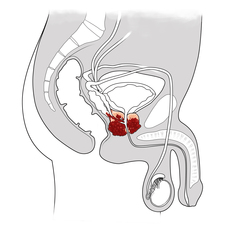Cancer is commonly defined as the uncontrolled division of abnormal cells. When cells become aged or damaged, they are replaced with new cells. Sometimes the genetic material (DNA) of a cell can become damaged or altered, producing mutations that negatively affect cell growth and division. Prostate cancer may be slow growing, or it may be aggressive. When confined within the prostate or another organ, cancer is known to be “localized” or “organ-confined”. When cancer cells spread throughout the body (metastasize) via blood and lymph systems, they can become life threatening.
Prostate cancer is one of the leading forms of cancer diagnosed in North American men, typically in men over the age of 50. In its early stages, prostate cancer has no symptoms, which is why it’s important for men to have regular medical checkups. If diagnosed early, prostate cancer is often curable. Treatment can eliminate symptoms and prolong life expectancy.
Risk Factors
There are several risk factors for prostate cancer, some modifiable, others not. These include:
- Age – Prostate cancer is most commonly diagnosed in men over the age of 50.
- Family History – Research shows an increased risk for prostate cancer in sons, brothers and fathers of men with the disease.
- Genetics – Inherited gene changes may increase prostate cancer risk.
- Diet – High fat, high calcium and high red meat diets may increase the risk of developing prostate cancer.
- Ethnicity – Studies have shown that prostate cancer is more common in men of African ethnicity.
For more information about the prostate, visit the Prostate Cancer Canada website.

